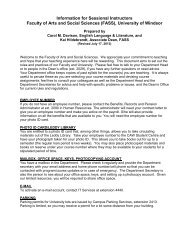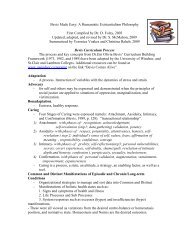No Exit: Racial Profiling and The War Against Terrorism
No Exit: Racial Profiling and The War Against Terrorism
No Exit: Racial Profiling and The War Against Terrorism
You also want an ePaper? Increase the reach of your titles
YUMPU automatically turns print PDFs into web optimized ePapers that Google loves.
41 OSGHLJ 293 Page 4<br />
41 Osgoode Hall L.J. 293<br />
documented. [FN15] Yet, several indicators suggest that Canadian Arabs <strong>and</strong> Muslims are subject to racial profiling.<br />
First, the silence of the legislature regarding the practice, at best, fails to effectively check racial profiling <strong>and</strong>, at worst,<br />
creates opportunities for racial profiling. [FN16] Second, a number of high profile cases suggest that racial profiling does<br />
take place in Canada's <strong>War</strong> against <strong>Terrorism</strong>. [FN17] Finally, while enacted laws do not explicitly endorse or encourage<br />
racial profiling, the same cannot be said of policies <strong>and</strong> directives developed by the institutions entrusted with fighting<br />
the <strong>War</strong> against <strong>Terrorism</strong>. [FN18]<br />
*298 <strong>The</strong> next section of this article suggests a topography of racial profiling in Canada. It is intended to encourage<br />
both scholars <strong>and</strong> advocates to fully explore racial profiling in all of its manifestations. <strong>The</strong> objective is not to provide a<br />
comprehensive analysis of the laws, policies, <strong>and</strong> practices that raise the spectre of racial profiling in Canada, but instead<br />
to highlight some provisions <strong>and</strong> practices for the purposes of buttressing the suggested classification. Emphasis is<br />
placed on those policies <strong>and</strong> practices that have not yet been subject to sufficient scrutiny from the perspective of equality<br />
law. Although they span across legal lines, it is possible to divide the anti-terrorism measures into three distinct categories<br />
with respect to racial profiling: (i) measures aimed at the Arab or Muslim communities in general; (ii) measures<br />
aimed at specific members of the Arab or Muslim communities; (iii) <strong>and</strong>, racially neutral measures aimed at the Canadian<br />
public as whole which nonetheless will likely disproportionately impact the Arab <strong>and</strong> Muslim communities.<br />
II. LEGISLATING THE WAR AGAINST TERRORISM AND RACIAL PROFILING<br />
A. Measures Aimed at the Arab <strong>and</strong> Muslim Communities in General<br />
When scholars <strong>and</strong> advocates discuss racial profiling in Canada, they tend to focus on practices <strong>and</strong> policies that target<br />
the Arab <strong>and</strong> Muslim communities in general for heightened security surveillance. <strong>No</strong>t surprisingly, since the hijackers<br />
of 9/11 transformed commercial airliners into weapons of mass destruction, both the public <strong>and</strong> politicians quickly<br />
turned their attention to airport security to query whether the felling of the World Trade Center, the attack on the<br />
Pentagon, <strong>and</strong> the crash of United Flight 93 might have been prevented with better screening of passengers at airports.<br />
Since the hijackers were alleged to be Arabs or Muslims, the debate quickly turned to whether Arabs <strong>and</strong> Muslims should<br />
be subject to higher scrutiny at airports. [FN19]<br />
Transport Canada does not officially condone racial profiling, however, employees of commercial airlines <strong>and</strong> airport<br />
security personnel have some discretion to determine if an individual or their belongings *299 should be subject to higher<br />
scrutiny than other passengers. [FN20] This discretion carries with it the power to remove someone from an aircraft.<br />
Hence, individuals are vulnerable to being subjected to higher scrutiny either because they look Arab or<br />
Muslim—women who wear the hejab for example—or because some other piece of information reveals them to be Arab<br />
or Muslim. Since 9/11, Arabs, Muslims, <strong>and</strong> those who look Arab or Muslim report being subjected to higher scrutiny at<br />
Canadian airports allegedly because decision makers consider them a greater security risk than the rest of the population<br />
by virtue of their real or perceived Arab or Muslim identity. [FN21] Although it took place in the United States, the case<br />
of Walid Shater, the Secret Service Agent who was ejected from an American Airlines flight when he was on his way to<br />
guard President Bush <strong>and</strong> his family on Christmas day, [FN22] has some relevance to Canada because it shows the<br />
propensity of at least some pilots who operate across national borders to regard Arabs <strong>and</strong> Muslims as security risks.<br />
[FN23]<br />
Faisal Joseph's experience at Hamilton International Airport also proves illustrative. Joseph, who is legal counsel to<br />
the Canadian Islamic Congress, was on his way from Hamilton to Ottawa when he was pulled aside for a heightened security<br />
check <strong>and</strong> ultimately made to miss his flight. Joseph links the treatment he received to the fact that he was carrying<br />
© 2010 Thomson Reuters. <strong>No</strong> Claim to Orig. US Gov. Works.





